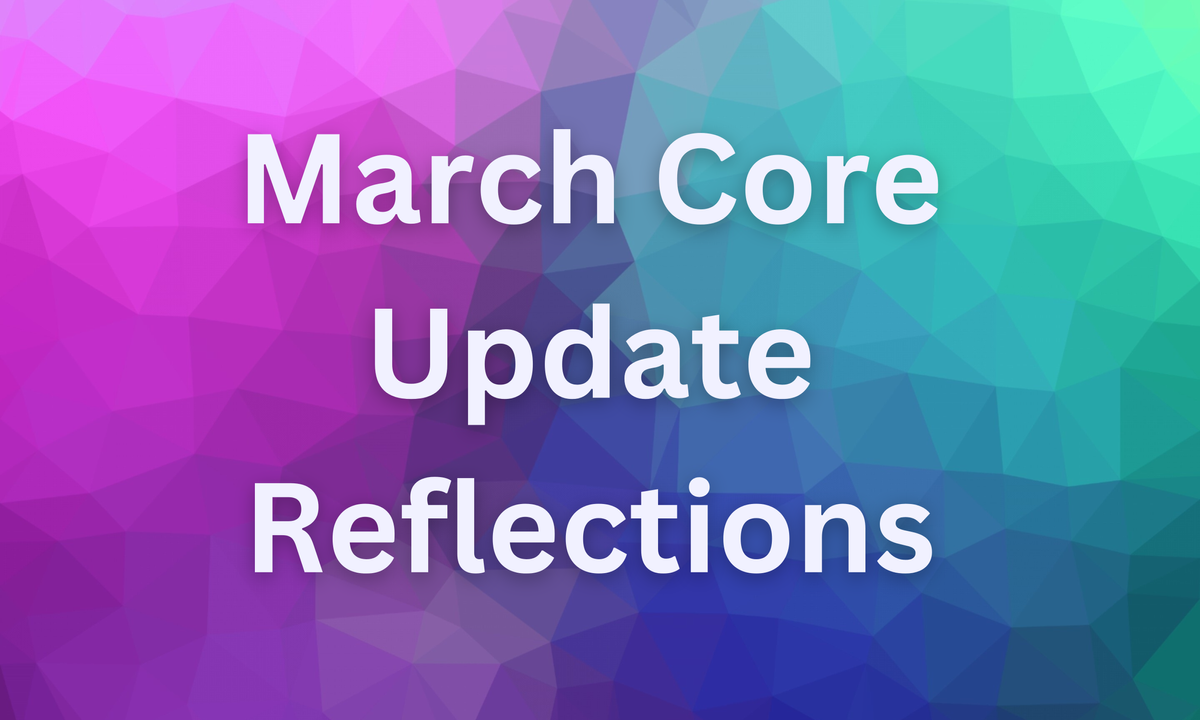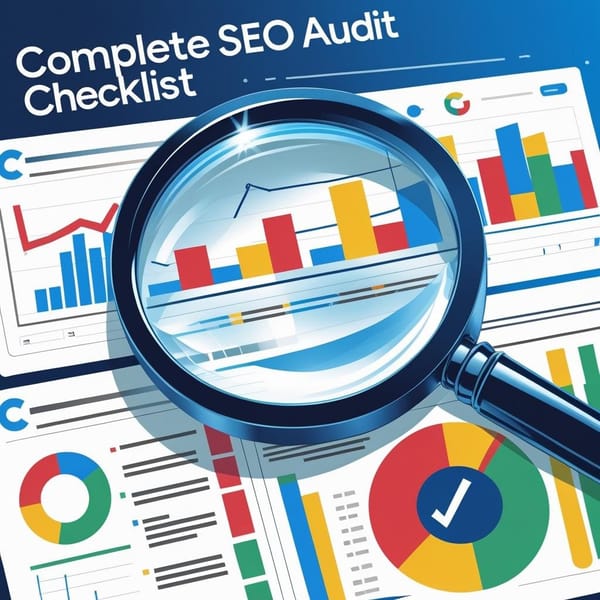March 2025 Core Update Analysis & Overview

Google rolled out its first core update of 2025 in March. It started on the 13th, finished on the 27th, and (like every broad core update) it wasn’t about targeting specific sites. It was about refining Google’s ranking systems across the board. No shiny features, no headline-grabbing changes. Just quiet shifts under the surface, aimed at surfacing more relevant, useful content.
The update was global. Every region, every language. And while ranking volatility showed up earlier in the month, Google confirmed that wasn’t connected to this release. This was a clean, two-week rollout. One that came a little later than expected, considering Google had hinted at ramping up frequency in 2025.
Rollout timing: The update ran from March 13 to March 27, with ranking shifts showing up both early and late in the rollout - some changes landed within days, others closer to the end. Google’s stance hasn’t changed: there’s no specific fix if your rankings dropped. Core updates aren’t about punishment - they’re rebalancing acts. If one page moves up, another moves down. The goal is always the same: reward content that’s more useful, relevant, and high quality.
This update is part of a broader push in 2025 to surface more content from actual creators. Google said we’ll see more improvements like this throughout the year—and some of that shift was already happening before this update even hit. But here’s the part worth sitting with: even if you’ve improved your content, recovery isn’t guaranteed. Some sites may not see real gains until future updates or larger changes take hold. Search is competitive. Recovery takes more than effort—it takes alignment, timing, and often, patience.
Observed Impact Across Industries
While broad core updates don’t target specific industries, the ripple effects were felt across the board. Tracking tools lit up with volatility once the rollout began, and multiple data sets confirmed it. One analysis (based on 100,000 keywords) called this the most volatile update in a year, with noticeable swings kicking off as early as the week of March 10. Another showed clear SERP instability by March 16 across both the US and UK. Bottom line: this update had range. And while no vertical was singled out, some sectors saw bigger shake ups than others. A few standouts:
- Health & Medical: Health sites saw mixed outcomes. A few high-authority medical information sites gained visibility, suggesting Google rewarded trustworthy health content. However, other medical/health sites saw declines, indicating that even within “Your Money or Your Life” categories like health, the update rebalanced rankings, favoring some sources and demoting others based on quality and relevance metrics.
- Finance & Legal/Government: Finance-related sites were also affected. For instance, the website of a major UK bank surged in search visibility, implying that authoritative financial institutions may have been boosted. Similarly, an official government business information site saw a solid gain. On the other hand, there weren’t prominent reports of major losses in this sector, suggesting many finance/government sites were already aligned with Google’s quality criteria. Overall, authoritative finance and government domains generally fared well, while any finance sites with thin or untrusted content may have lost ground.
- News & Media Publishers: News organizations did not appear to be a primary focus of this update, but there were some shifts. Some news publishers reported changes in Google Discover traffic as well, with a few losing visibility on Discover, possibly due to the core update’s impact on what content is deemed relevant for that feed. Generally, the update did not disproportionately target news media, but ranking shuffles still occurred in the news sector. Anecdotally, some webmasters complained of “nonsense” articles or low-quality content appearing in Top Stories/News results after the update, though this is subjective. Major news sites largely saw minor ups or downs, consistent with the broad nature of the update.
- E-commerce & Retail: Online retailers experienced significant rank volatility. Many e-commerce sites saw their search visibility recalibrated. Notably, one of the giants was impacted – its pages lost some visibility. Some other large retail brands also saw declines, while several commerce sites gained: in one market, a general retailer rose moderately, and a fashion retailer jumped noticeably during the rollout. Mid-sized retail sites were among the standout gainers. It appears Google adjusted how it ranks product pages and category pages, likely rewarding sites with strong content and user experience. Some smaller online shops reported traffic declines, (one WebmasterWorld user noted “the update seems to be targeting small websites and especially shops” suggesting that larger or more authoritative retail sites may have been favored over thin smaller ecommerce sites. Overall, the retail/e-commerce sector saw a lot of churn – some big winners, some losers – but no single trend beyond an emphasis on quality and authority.
- Affiliate & Thin Content Sites: Websites that rely heavily on thin, aggregated, or AI-generated content generally saw losses. Google explicitly stated the update further rewards high-quality, user-focused content, and data showed that shallow, AI-generated, or low-value content sites were hit. This means affiliate sites with thin product review pages or programmatically generated content were likely downgraded. High-E-E-A-T affiliate sites (with original, expert content) fared better, whereas those with mere AI text or scraped info lost visibility. This continued Google’s trend of cracking down on “thin affiliate” content that doesn’t provide unique value.
- Forums & User-Generated Content: One of the most notable patterns was a reversal in high rankings for forum websites and UGC platforms. For about 1–2 years prior, Google had a known “hidden gems” tweak that boosted forums (surfacing helpful threads for queries). However, with this March update many forums saw dramatic drops. Industry observers noted a “recalibration of how Google values forum content,” as many forum sites that had enjoyed heightened visibility since mid-2023 are now experiencing substantial declines. For example, niche discussion forums like DIYChatroom.com and GarageJournal.com (which had skyrocketed over 1000% in the past year) suddenly plunged in rankings during this update.
Even the Q&A giant Quora was hit hard (more on that below). On the other hand, Reddit (of course) appears to have bucked the trend by leveraging translated content (discussed later). In summary, Google adjusted the balance for user-generated content: many forums lost some of their prominence in favor of other content types (or in favor of a few strong UGC sites like Reddit). This suggests Google is fine-tuning how much weight to give community-driven content versus expert/authoritative content in search results.
SEO tracking tools reported extremely high search result volatility during the rollout. For example, one sensor hit “Very High” levels in mid-late March 2025, reflecting the broad ranking turbulence caused by the core update. (Source)
Notable Winners and Losers
Like every major core update, this one created a clear divide—some sites saw a sharp rise in visibility and traffic, while others took a hit. Early data and post-rollout analysis from several SEO firms have already surfaced clear patterns. Here’s a look at some of the standout “winners” and “losers” from the March 2025 update:
Winners (Visibility Gains):
- Reddit.com – Reddit continued its surge in Google search. Its visibility, which had already been climbing since late 2023, got another boost. In fact, AI-translated content now ranks in many non-English markets; one analysis showed a notable traffic surge for its French-translated pages. Reddit’s strategy of allowing Google to index millions of user-generated posts (including those auto-translated into various languages) appears to be paying off, making it a big winner while other forums fell.
- Yelp.com – The local reviews site saw notable ranking improvements. Yelp was highlighted as a winner by tracking local/home-service queries, suggesting that Google rewarded robust review content and strong user feedback on local businesses.
- NotOnTheHighStreet.com – A UK-based online marketplace that aggregates unique products experienced a significant visibility increase in UK search. This gain indicates that Google’s update favored its content, likely due to comprehensive product information and its unique offerings compared to larger marketplaces.
- Uniqlo.com – The global apparel retailer’s site jumped dramatically in organic visibility in the UK. Uniqlo’s gain exemplifies how strong brand retail sites with quality content (good product pages, user reviews, etc.) were rewarded. Other retail winners in various markets included several well-known retailers which saw double-digit percentage gains.
- Thesaurus.com – This reference site, a popular online thesaurus, saw a visibility boost in the UK. Dictionary and reference sites can sometimes lose out to direct answers or rich results, but in this update, well-established reference resources were rewarded. Another related dictionary site also experienced a significant jump.
- Other winners: Industry chatter also pointed to some home improvement content sites as winners, likely due to authoritative DIY guides, and major home improvement retailers saw improvements. These reinforce the pattern of strong content and authoritative brands gaining. Additionally, some informational sites and nonprofits gained visibility, possibly as Google sought to surface a more diverse set of content.
Losers (Visibility Declines):
- Quora.com – was one of the most prominent losers. After enjoying a long run of increased visibility, it saw a significant drop post-update, with estimates showing a notable percentage decrease in visibility. Its decline is emblematic of the broader forum downturn – Google appears to have tempered the boost it had been giving to Q&A and forum content. My thoughts are it perhaps wants to show preference to content displayed for non-logged out users.
- Amazon.com – Amazon did not make it out unscathed. Its search visibility fell noticeably during the update. Some of its myriad pages (particularly thin, affiliate-like pages or less useful content) likely lost rankings to more content-rich sites. However, its drop was moderate relative to smaller sites; it remains dominant in many commercial queries, but this update showed that even top domains can lose some share when Google refines relevance.
- Expedia.co.uk – Travel sites were hit-and-miss; in one market, this travel aggregator saw roughly a 20% drop in visibility. This could be due to Google favoring more specialized or content-rich travel pages.
- Zara.com – Zara lost a significant portion of its Google visibility in the UK. This drop, alongside hits to other direct-to-consumer fashion brands, suggests that some branded stores may have been outranked by either larger marketplaces or more content-rich competitors. It highlights that brand alone didn’t guarantee immunity in this update – content depth and SEO structure mattered.
- Forum Sites (in general): Beyond Quora, many niche forums and message boards suffered steep declines. Several niche discussion forums lost massive visibility after having been big winners in previous updates. Even forum hosting networks reportedly saw large drops. This pattern indicates that Google lowered the prominence of user-generated discussions, especially when other content can answer the query.
- Other notable losers: Some learning or reference sites and tech/software download sites experienced significant drops, which could tie into thin content or duplicate pages. Additionally, several sites with primarily programmatic or thin content saw big losses – consistent with Google targeting “made-for-SEO” content. Overall, sites that lost tended to be those with weaker content quality, less authority, or an over-reliance on SEO gimmicks.
It’s important to note that these winners/losers lists are relative – a drop doesn’t always mean a site is “bad,” just that Google found other pages more relevant after the update. Conversely, a gain often means the site’s SEO and content were aligned with what the updated algorithm prefers. The March 2025 update, in particular, produced fewer extreme cases than some previous updates. Many changes were moderate in scale, though clearly significant to the businesses affected.
SEO Community Reactions and Sentiment
Reactions to the March 2025 update were, unsurprisingly, all over the place. Relief from those who saw a boost. Frustratio (and in some cases,panic) from those who didn’t. The SEO community lit up across forums, industry sites, and Twitter (or X, depending on how nostalgic you are), offering a wide range of takes. Here’s a snapshot of what people were seeing—and saying.
- “Not as widespread as some previous updates”: Google’s Search Liaison and some commentators noted that this core update, while impactful, didn’t produce the same volume of complaints as a few earlier ones. Barry Schwartz (of Search Engine Roundtable) observed that it “did not seem as widespread as some previous core updates”, although for those who were hit, it was “100% very big”
This suggests that the SEO chatter volume was slightly lower than, say, the large core updates of 2021–2022 – but anyone who lost rankings felt it acutely. Some SEOs theorized that because this update’s changes were somewhat more subtle or spread out, fewer people realized they were impacted until digging into their analytics.
- Forums and UGC debate: A major talking point was the drop in forum rankings. Lily Ray highlighted early on (March 26) that “after 1.5 years of major visibility surges for thousands of forums, I am seeing early signs of major drops among some forum sites”
She shared data showing forums like Quora and others dipping, calling it a “pretty clear trend.” Later she quipped that “the SEO glory days of ‘just be a forum and you’ll rank’ might be coming to an end.”
This sparked discussion about whether Google was dialing back its 2023 boost to user forums. Some welcomed this change, feeling that forums had been cluttering results for informational queries, while others lamented the loss of traffic to their communities. Glenn Gabe, agreed with Lily’s assessment and added that Reddit was an exception – Reddit has “skyrocketed in visibility” since late 2023 and even boomed further with this update, partly due to its AI-translated content strategy
In essence, the SEO community took note of Google seemingly shifting emphasis away from niche forums toward either more authoritative sources or a few broad UGC platforms (like Reddit). This was one of the most discussed outcomes of the update on social media.
- Content Quality and Low-Value Content: This update reinforced what most SEOs already know: Google’s still laser-focused on quality. Andrew Shotland, CEO of Local SEO Guide, flagged a couple of key patterns - forum content took a hit, and so did those bloated, made-for-SEO sites packed with low-value pages. Across LinkedIn and Twitter, people shared examples of sites with thousands of thin pages getting knocked down in the rankings. No one was shocked. Core updates have a long history of targeting content quality.
But that didn’t make the fallout any easier. On WebmasterWorld, some site owners reported traffic drops of 50% or more—one called it their worst decline since the Panda era, pegging it at -70%. There were a lot of “we did everything right” posts from people who followed guidelines to the letter, only to get outranked by competitors with content they saw as weaker.
- Publisher and Marketer Responses: For publishers, the response was a mix of low-key concern and quiet recalibration. No major outlets came out swinging, but a few newsrooms acknowledged traffic shifts behind the scenes. Industry blogs like Search Engine Journal and Search Engine Land (mostly summarized here and linked) did their usual quick analysis, calm reassurance, and a reminder that drops aren’t penalties, just signals that something might not be working.
Over on Twitter/X, SEOs speculated. A few pointed out that sites hit by the Sept 2023 Helpful Content Update were hit again which could be another sign that Google’s not backing off when it comes to suppressing content it sees as low-value. That’s anecdotal, but consistent.
And yes, the irony was noted: while thin content took a beating, Google’s own AI results (SGE) are now surfacing more thin, auto-generated answers. Which means the bar just got higher for everyone else. If your content doesn’t stand out, it’s not going to stand at all.
Most pros landed in the same place: keep focusing on quality, technical performance, and E-E-A-T. Those who lost traffic weren’t thrilled—but they also weren’t shocked. Time to reassess, not retreat.
- User Experience of Results: Some webmasters have expressed concern over the search results quality post-update. A comment on WebmasterWorld argued that “the nonsense in the top positions on Google is increasing” after this update, claiming that Google was ranking more low-quality sites or irrelevant content in their niche. Another noted Google News results were showing more off-base content. However, these observations are anecdotal and niche-specific.
In other areas (like tech queries or local searches), users might have noticed improved results. No widespread backlash from general users was reported – unlike certain past updates, there wasn’t an outcry in mainstream media about “Google results got worse.” This aligns with one webmaster’s remark: “I wonder why there is no outcry outside the SEO community…” – indicating that while SEO folks dissect every ranking change, the average user likely didn’t perceive a dramatic difference in their day-to-day Googling. Google’s goal, of course, is that these core updates make results better for users, and the lack of negative user buzz suggests the changes were within acceptable bounds.
Recovery Guidance and Recommendations for Affected Sites
For sites that lost rankings or traffic after the March 2025 update, the advice is consistent across the board: don’t react quickly out of frustration. There’s no shortcut here. Core updates don’t come with a fix - it’s about improving, staying consistent, and proving your content deserves to rank. Recovery is possible, but it takes time. The clearest path forward will be a focus on quality and value. Here’s where to start:
- Audit and Improve Your Content: Perform a thorough content audit to identify pages that lost rankings or provide subpar value. Update outdated posts with fresh, comprehensive information. Remove or revamp thin pages that don’t meet user needs. Often, large drops indicate that a percentage of your content wasn’t deemed as helpful as competitors’ – focus on making every important page genuinely useful.
- Strengthen E-E-A-T (Experience, Expertise, Authoritativeness, Trust): Google’s core updates heavily evaluate site credibility and trustworthiness. To recover, bolster signals that demonstrate your expertise and authority in your niche. This means ensuring that authors of content are clearly identified with relevant expertise, adding author bios or credentials where appropriate, citing reputable external sources to support facts, and showcasing trust factors (such as contact info, business details, and privacy policies). For sites in sensitive sectors, these factors are even more critical.
- Remove Low-Value/Programmatic Pages: A notable pattern in this update was the penalization of programmatic SEO pages – those churned out at scale with little unique value. If your site has sections with autogenerated or duplicate content, consider consolidating or removing them. Quality beats quantity, so focus on pages that receive traffic and serve a clear purpose.
- Enhance the User Experience: Technical and user experience factors can indirectly influence rankings. Ensure your site is fast, mobile-friendly, and easy to navigate. Improving site speed, fixing usability issues, and optimizing internal linking can all contribute to better engagement, which in turn can improve rankings over time. Also, review your indexing to ensure important pages are crawlable and indexable.
- Diversify Traffic Sources: One lesson repeated in the community was not to rely solely on Google. If a core update slashes your traffic, having other traffic streams (such as social media, email subscribers, or direct visits) can cushion the blow. While this doesn’t directly help recover Google rankings, it is a smart business strategy to reduce vulnerability while you work on SEO improvements.
- Follow Google’s Guidelines and Advice: Google’s official webmaster guidelines remain highly relevant. Revisit those guidelines, which emphasize self-assessing your content quality, uniqueness, authority, and user benefit. Aligning your site with these best practices is key to long-term recovery and success.
- Be Patient but Persistent: Recovery from a core update typically takes time. Significant improvements may only become evident after Google re-crawls and re-indexes your updated pages or after a subsequent core update. The key is to implement changes as soon as possible and monitor your progress over time.
In essence, the advice is consistent with previous core updates: improve content, enhance user experience, and align with Google’s quality criteria. There are no niche “tricks” for reversing the effects of a core update – success comes from sustained, long-term improvement in your website’s overall value to users.
Relation to Other Recent Updates and Spam Overlap
The March 2025 core update was a standalone release. No spam update, no product reviews update, no vertical-specific rollout layered on top. Google confirmed that any ranking shifts before March 13 weren’t part of this—so if you saw movement in early March, it came from something else.
There was no SpamBrain or link spam update running in parallel. Yes, Google’s spam systems are always active behind the scenes, but what we saw in March was driven by the core update itself.
The impact was broad. Forums, retailers, government sites—no single vertical was singled out. That said, some site owners noticed a reversal of earlier gains made by forums, hinting at adjustments to past changes. Not a new update—just a reminder that core updates can recalibrate previous signals.
Google also made it clear this update is part of a bigger 2025 plan to surface more content from a wider range of creators. It may have been a standalone rollout, but it’s not isolated. Expect more updates in this direction.




